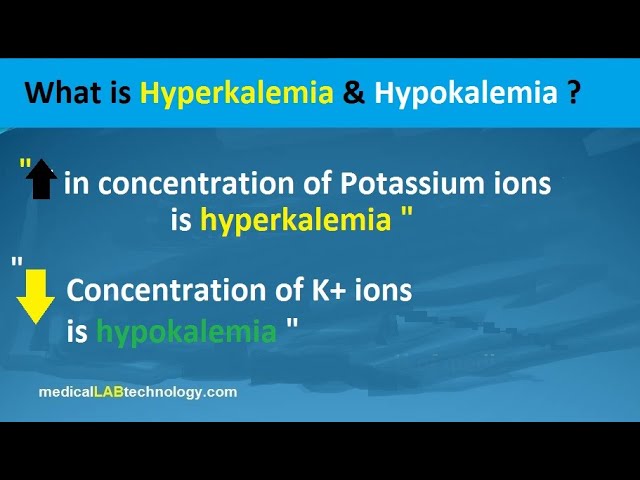Human blood consists of blood cells (red blood cells, white blood cells, and platelets) and electrolytes (sodium, potassium, and calcium ions).
Some diseases change electrolytes concentration like Cushing disease cause hypernatremia while Addison disease causes hyponatremia.
Some diseases alter the potassium level and cause hyponatremia or hypernatremia.
Hyperkalemia and hypokalemia are two opposite conditions related to the levels of potassium in the blood:
- Hyperkalemia: This refers to elevated levels of potassium in the blood. Normal blood potassium levels typically range from 3.5 to 5.0 milliequivalents per liter (mEq/L).
- Hyperkalemia is diagnosed when potassium levels exceed the upper limit of the normal range. It can be caused by various factors,
- kidney dysfunction, certain medications (e.g., ACE inhibitors, potassium-sparing diuretics), excessive potassium intake, adrenal gland disorders, or certain medical conditions.
- Hyperkalemia can be potentially life-threatening and may lead to cardiac arrhythmias and other serious complications.
- Hyperkalemia is diagnosed when potassium levels exceed the upper limit of the normal range. It can be caused by various factors,
- Hypokalemia: This refers to low levels of potassium in the blood. It is diagnosed when potassium levels fall below the lower limit of the normal range.
- It can result from factors such as excessive potassium loss through the urine or gastrointestinal tract (e.g., due to certain diuretics, diarrhea, vomiting), inadequate dietary intake of potassium, certain medications (e.g., diuretics), or medical conditions that affect potassium balance.
- Hypokalemia can lead to muscle weakness, fatigue, abnormal heart rhyth
Causes of hypokalemia
Following are the causes of hypokalemia.
- Loss of potassium from the body causes hypokalemia
- Prolong vomiting
- Diarrhea
- Hyperaldosteronism (secondary)
- Hyperaldosteronism
- Cushing syndrome
- Renal tubular acidosis
- Renal tubular failure
- Carbonoxolone therapy
- Fanconi syndrome
- Due to reduce intake: Chronic starvation
- Re-distribution in the body
- Alkalosis
- Insulin and glucose therapy
- Familial periodic acidosis
Causes of hyperkalemia
Hyper means “more” and kalemia means “potassium“. Increase in concentration of potassium ions level in the body.
Following are the causes of hyperkalemia.
- Gain of potassium to the body
- Overenthusiastic potassium therapy
- Not stopping therapy after correction.
- Renal Secretion failure
- Diuretic working on the distal tubules, spironolactone, amiloride, and triamterene.
- Hypoaldosteronesim
- Renal failure
- Redistribution in the body
- Severe tissue damage
- Hypoxia
- Acidosis
- Diabetic keto-acidosis
- Shock
